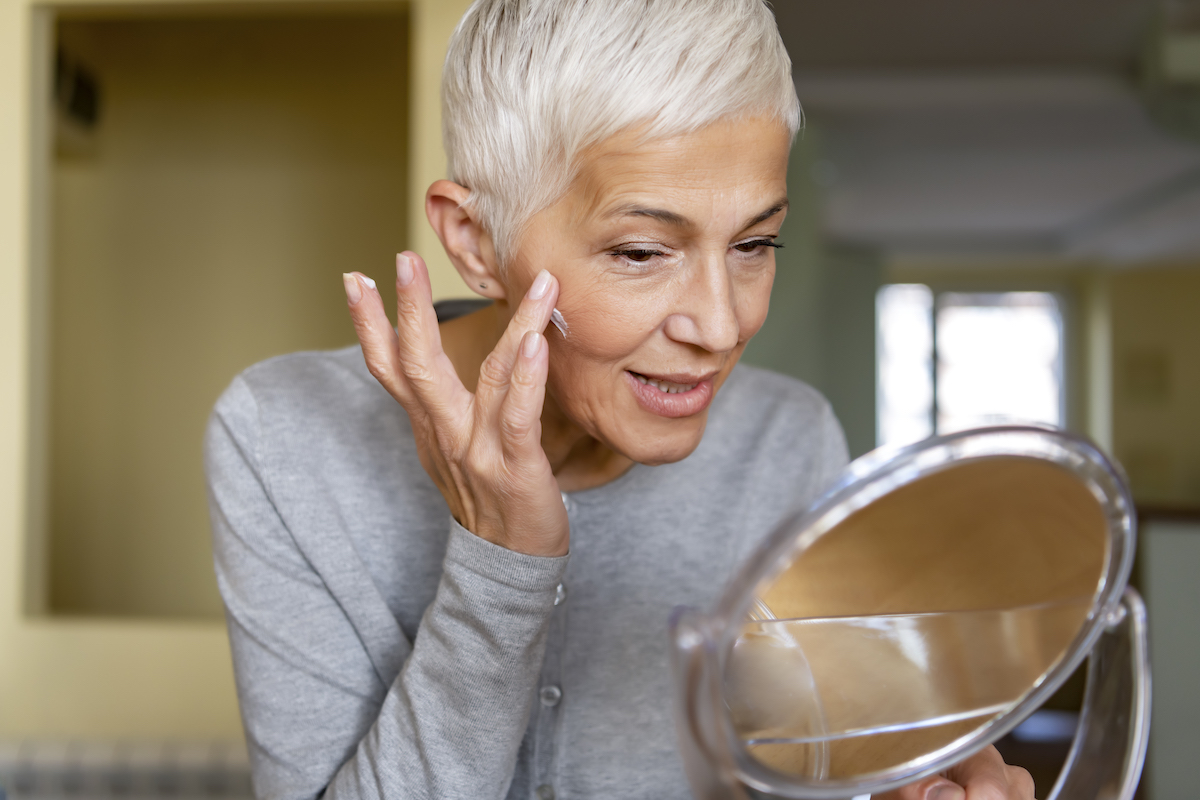Sensitive Skin? Avoid These 3 Ingredients
Looking at the label could save you from irritation and redness.

One of the best tips from nutrition experts is to look at labels so you know what you’re really eating—but that advice isn’t just for food. Dermatologists recommend taking a glance at the ingredients in skin care and household cleaning products as well, especially if you have sensitive skin.
That’s because some common product ingredients that help fulfill promises to lather nicely, cleanse deeply, and smell fresh can sometimes irritate the skin or aggravate allergies.
So, what should you be trying to avoid? Here, top dermatologists share three ingredients it’s best to skip.
Ingredient to Avoid #1: Added fragrances
Some products will have a mild, pleasant scent from the ingredients themselves. And that’s usually not a big issue. It’s when extra fragrance chemicals are added that it can become a problem, says California-based board-certified dermatologist Lily Adelzadeh, M.D. She says added fragrances are among of the top contact allergens found in skin care products. A quick look at the ingredients will let you know if a scent chemical has been added.
“I understand that fragrance smells nice in skin care products,” Dr. Adelzadeh says. “However, I think it’s a good idea to stay away from any products with fragrance added, especially if you have a history of eczema.”
That’s because contact allergens—just like it sounds, these are allergens that cause a reaction on your skin—can lead to a condition called contact dermatitis (a.k.a. a red, itchy rash). Those with eczema have been shown to be at a higher risk of having this happen, she says.
Keep in mind that fragrance isn’t just an issue with skin care–specific products, adds Susan Bard, M.D., a dermatologist at Manhattan Dermatology Specialists in New York City. Contact dermatitis can also happen with laundry detergents, shampoos and conditioners, perfumes, and even air fresheners and scented candles.
Ingredient to Avoid #2: Sulfates
Ammonium lauryl sulfate and sodium lauryl sulfate are two ingredients commonly used in a variety of household cleaning products, including spray cleaners, dishwasher detergents, and laundry detergents. They’re used to create lather and cleanse more deeply.
For people with sensitive skin, exposure to these ingredients more than a few times per week may cause irritation, according to research in Environmental Health Insights.
This can be even more pronounced if you’re using a product with a strong fragrance as well. If you already have products with these ingredients in your home, you may want to use gloves when cleaning to minimize your skin’s exposure.
Some shampoos also contain sulfates that can strip away moisture, leaving your hair and scalp itchy, dry, or brittle. If you have sensitive skin, or a skin condition such as eczema or psoriasis, or particularly dry, frizzy hair, look for “sulfate-free” on the label.
It may take time to get used to the lack of suds, but sulfate-free shampoos generally clean hair just as effectively as other shampoos—without the uncomfortable side effects.
Subscribe to our newsletter
It's quick and easy. You could be one of the 13 million people who are eligible.
Already a member? Click to discover our 15,000+ participating locations.
Follow Us
Ingredient to Avoid #3: Alcohol
As we age, skin loses moisture and elasticity, becoming more fragile, says board-certified dermatologist Adam Mamelak, M.D., who’s based in Austin, Texas. If your skin is also sensitive, you need to be even more aware of ingredients that may have a drying effect. For example, traditional soap can be an issue for many people because it depletes the natural oils on the skin, he says.
Another challenge is products containing alcohol, which is standard in many toners and some creams, as it enables them to absorb faster. There are some alcohols that can be nourishing, so look for words like cetyl, stearyl, cetearyl, and propylene—those can all be helpful to the skin. The less helpful kinds are:
- Isopropyl alcohol
- Ethanol
- Denatured alcohol
- SD alcohol 40
These alcohols in skin care products can feel refreshing at first, which is what toners are meant to achieve. That might seem useful in the short term, but it causes problems over the long term. Dr. Mamelak suggests skipping it.
Choosing products that are fragrance-free and don’t contain drying ingredients can be a good first step toward keeping your skin well-hydrated and resilient. Want more specific suggestions? Check out these drugstore skin care products dermatologists love.
Check Your SilverSneakers Eligibility Instantly
SilverSneakers members can go to thousands of gyms and fitness locations across the nation, plus take SilverSneakers LIVE online classes that are designed for seniors of all levels. If you have a Medicare plan, it may include SilverSneakers—at no additional cost. Check your eligibility instantly here.
Not eligible for SilverSneakers? You can still get 200+ free SilverSneakers On-Demand videos and stay in touch with us by creating your online account.




